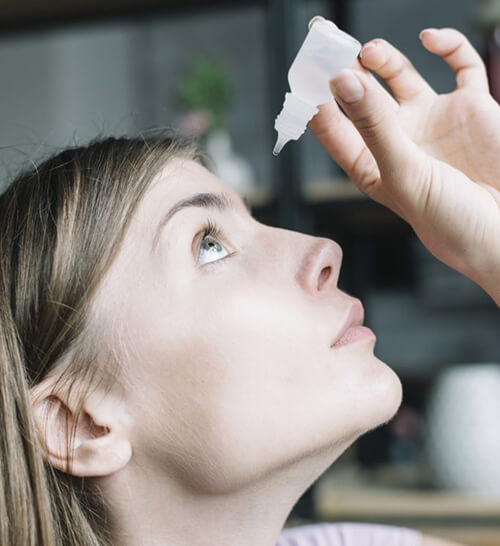

Scrapes and skinned knees are commonplace injuries that we’ve all suffered at one time or another. Fortunately, for most of these minor accidents, taking some precautions like cleaning a cut and covering the wound with a bandage will help the body to naturally heal. That’s fine for your skin, but what about scratches to the eyes?
Just like you can cut your skin, your eyes can also be injured by the result of an accident or outside material getting into the eye. These scratches to the eye – known as corneal abrasions – can occur for a variety of reasons, but fortunately can also be healed easily with appropriate care. Let’s learn some of the common causes of this form of eye trauma and what to do if it happens to you.
What Causes a Corneal Abrasion?
It’s easy to understand how we end up with cuts and scrapes to our hands, feet, knees or elbows in our day-to-day activities, but our eyes are far more protected. So how can you scratch your eye?
Some of the most common ways you can get a scratch are from activities you probably do every day. The American Academy of Ophthalmology notes accidentally poking your eye with a fingernail or while applying makeup, rubbing your eyes too hard, or having foreign material fall into your eye such as dust, ash or other environmental debris, are all frequent culprits. You may also suffer a corneal abrasion while swimming, if stirred-up sediment gets into your eyes. Oftentimes people sustain corneal abrasions while playing a sport or engaging in other high-risk activities.
Another common source of corneal injury is contact lenses. You can easily sustain a corneal abrasion from debris on a contact lens, whether as a result of poor cleaning practices or dirt getting trapped on your lens while inserting or removing a contact. If dirt becomes trapped between the contact and your eye, it can cause a series of abrasions, causing greater irritation and potentially more risk of damage to the eye. It is important to note that if your eye is red and irritated and you are a contact lens wearer, you should not reinsert your contact lens. Patients who have a corneal abrasion who continue to wear their lenses may cause more damage to their eyes. Similarly, dirt trapped under the eyelid – with or without contacts – can also cause repeated trauma as you blink.
Removing Irritants from the Eye
If you are experiencing discomfort or irritation in your eye from a foreign substance, the automatic reaction you have is to rub your eyes. However, this can make things much worse if there is something still in contact with your eye. The first thing to try instead is repeatedly blinking. Your eyelids naturally work to lubricate and protect the eye, and blinking can help dislodge any dirt or grime that shouldn’t be in your eye. You may also use a saline solution or clean water to try and clean the eye and remove any irritant.
However, if you are unable to remove the foreign substance or if you suspect it may be stuck or embedded in the eye, it’s important to see a doctor immediately. You should also seek care if you have persistent blurry vision, pain in the eye, visible redness or irritation, or are unable to open your eye consistently. Your doctor can use a specialized dye that will highlight any scratches or cuts on the eye and help identify if there is a significant trauma. In serious cases, when something is stuck in the eye – what is known as an intraocular foreign body – your doctor may also need to perform surgery to remove the irritating material, though only in the most extreme cases.
Treating a Scratch to the Eyes
Depending on the extent of a corneal abrasion, treatment options can vary. If you’ve suffered a minor scratch, your eye doctor may recommend wearing a patch temporarily to minimize blinking that can further irritate the eye. For more pronounced cases, an ophthalmologist may prescribe moisturizing or antibiotic eye drops or ointment to use for several days. In some cases, dilating drops are prescribed to help manage eye pain.
In serious cases or for large scratches, your doctor may need to use a specialized contact lens that serves as a protective bandage for the eye. This can happen if you’ve suffered a number of small cuts or a larger cut to the eye, or if you had a foreign object that needed to be removed through surgery.
Recovering from a Corneal Abrasion
Fortunately, with proper care and treatment, corneal abrasions are most often temporary and unlikely to cause any long-term damage or impact to your vision. Seeing your doctor is critical, however, if you suspect a serious scrape or problem. The experts at the Ross Eye Institute can provide care for corneal abrasions, and a full range of routine and specialized eye conditions. For an appointment in our Buffalo or Amherst office, call 716.881.7900, or for Orchard Park, contact us at 716.677.6500.


